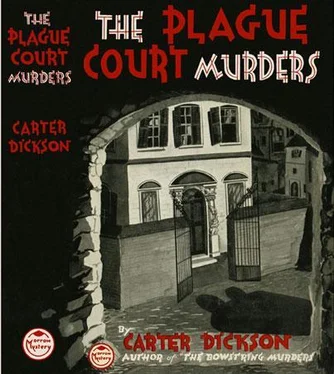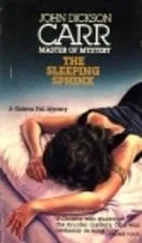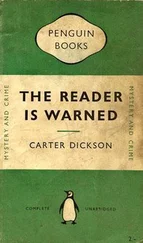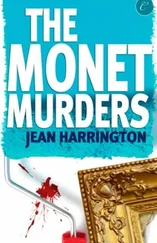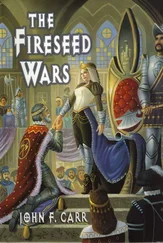"He's not been dead five minutes," I said. (This, we later learned, was a correct estimate). "Though," I wasbound to
add, "it might have been difficult for a police surgeon's diagnosis later. He's lying directly in front of a blaze that would keep the body at a much hotter temperature than blood-heat for some little time...."
The fire, in fact, was scorching, and I moved back on the slippery bricks. The man's right arm was doubled up behind him; his fingers were gripping an iron blade about eight inches long, with a crudely fashioned hilt and a bone handle on which were visible the letters L.P. - faintly visible through the stains. It was as though he had plucked it out before he died. I stared round the room.
"Masters," I said, "this thing is impossible………'
He swung round savagely. "Ah! Now we have it. I know what you're going to say. Nothing could have come through windows or door, and got out again. I tell you it did happen, and by ordinary means, and, so help me, I'm going to find out-!" His big shoulders relaxed. The bland face looked suddenly dull and old. "There must be a way, sir," he repeated doggedly. "Through the floor or ceiling or something. We'll go over every inch of it. Maybe one of the window-gratings can be removed. Maybe I don't know. But there must be. . . . Keep out, if you please!" He broke off and waved towards the door. Halliday's face had appeared in the aperture. His eyes slid momentarily to the thing on the floor; he winced with a startled spasm, as though somebody had prodded a wound; then he looked straight at Masters, his face a muddy pallor, and spoke rapidly:
"There's a copper out here, Inspector. You know, a-" he was having trouble with his words, "a policeman. We - we made a row with that log, and he heard it, and-" Suddenly he pointed. "Darworth there. He's-?"
"Yes," said Masters. "Keep out of here, sir, but don't go up to the house yet. Tell Sergeant McDonnell to bring the constable in. He'll have to make a station report. Steady, now!"
"I'm all right," said Halliday, and put his hand over his mouth. "Funny. It - it looks like bayonet practice."
That unholy image had occurred to me also. I peered round in the gloom again. The only touch of past splendor in this ruin, of a time when it had been lined with Sir Richard Seagrave's Bayeux tapestries and cabinets of Japanese lacquer, remained in the solid oak ceiling. I saw Masters carefully putting down an inventory in his notebook, and as I followed his eyes I noted also the only other things in the room: (1) a plain deal table, overturned about six feet out from the fireplace, (2) a kitchen chair, also overturned, with Darworth's overcoat across it, (3) a fountain-pen and some sheets of paper, lying in the blood behind Darworth's body, (4) an extinguished candle in a brass holder, which had rolled to the middle of the floor, (5-6) the brick attached to the bell-wire, already indicated, and the mop and broom leaning on the wall beside the door.
And, as a final touch of horror, the spice burned in the fire was a sort of wistaria incense, which clogged the air in a sickly-sweet fog.... The whole case, the whole atmosphere, the whole tangle of contradictions, cried that there was something wrong in these facts.
"-Masters," I said, as though in the middle of a conversation, "there's another thing, too. Why didn't he cry out, when he was attacked like that? Why didn't he scream or make some noise, in addition to trying to get at that bell?"
Masters looked up from the notebook.
"He did," said the inspector unsteadily. "That's just it. He did. I heard him."
VII PLAYING CARDS AND MORPHINE
YOU see," Masters went on, clearing his throat, "that's the worst part of it. It wasn't a good healthy yell or scream, that'd 'uv brought me out fast and ready for trouble. It wasn't very loud at all; but it got faster and faster-I could hear him talking-and then as though he were begging and imploring somebody, and then as though he'd begun to moan and cry. You wouldn't have heard it at all, in where you were. I only heard it because I was outside, coming round the side of the house before then...."
He stopped, stared round, and wiped his forehead with a gray cotton glove much too large for him.
"I admit it scared me. But I thought it was only a part of this man's game, whatever it was. The voice got quicker and quicker, and more shrill. I could see some shadows chasing round on the window; it looked - it looked hellish, in that red light. And I wondered what to do. Did you ever have the sure and certain instinct that something's really wrong, though you think it's only a game?-and yet you hesitate, and stand there without doing anything, and afterwards it turns you sick to think what you should have done." He opened and shut his hands: big and grizzled, a solid man in a mad world, peering round with dull blue eyes. "I shall be lucky not to be demoted for this, sir. Well, I heard that; and all I did was stand there. Then I heard the bell."
"How long afterwards?"
"Well, say a minute and a half after the noises had stopped. I've bungled," he said bitterly, "I've bungled everything."
"And how long did these noises last?"
"A little over two minutes, I should think." He remembered something, and entered it in his notebook; the furrows were deepening in his big face. "But I only stood there at the back door to the passage. Like a mug! Like-never mind, sir. As though something was holding me, eh? Ha! You see, I was exploring. I'd gone out the front door of the house.... The shattered door creaked then. McDonnell slid through, accompanied by a policeman whose helmet and great black waterproof seemed to take up the whole room. He saluted Masters, seemed unsurprised, and said in one of those crisp Force voices of indeterminate accent: "Yes, Sir? District station-house report, sir. Very necessary." His waterproof made a big surge and swish as he whipped out a notebook, and under cover of it I got out at the door.
Even the yard smelled fresh after the foul air of the little room. The sky had cleared, and there were stars out. A short distance away, Halliday stood smoking a cigarette.
"So the swine's done in," he observed in a matter-of-fact tone. I was startled to see that there was neither nervousness nor affected ease about him. The glow of his cigarette caught crinkled, rather mocking eyes. "And with Louis Playge's dagger, all according to schedule, eh? Blake, this is a great night for me. I mean it."
"Because Darworth's dead?"
"No-o. Because the whole game has been queered." He hunched his shoulders under the raincoat. "Look here, Blake. I suppose you've read the dark history? Masters said you were hard at it. Let's be rational. I never really believed in all that nonsense about 'possession', or the prowling spook either. I'll admit it upset me. But now the whole air is cleared - Lord, and how it's cleared! By three things."
"Well?"
He meditated, drawing deeply on his cigarette. Behind us we could hear Masters and McDonnell arguing, and heavy footsteps clumping about.
"The first, old boy, is that this bogus ghost has definitely destroyed his ghostliness by killing Darworth: So long as, it only prowled and rattled windows, it could alarm us. But here's the funny thing: the moment it takes an extremely ordinary lethal weapon and punches holes in somebody, we get skeptical. Maybe if it had only come in and slashed at Darworth a couple of times, then killed him with fright, it would have been effective. A stabbing ghost may be good spiritualism, but it isn't good sense. It's absurd. It's as though the ghost of Nelson had stalked up from the crypt of St. Paul's, only to bean a tourist with its telescope.... Oh, I know. It's horrible, if you like. It's inhuman murder, and somebody ought to hang. But as for the ghostliness . . . “
"I see the point. And what's the second thing?"
Читать дальше
